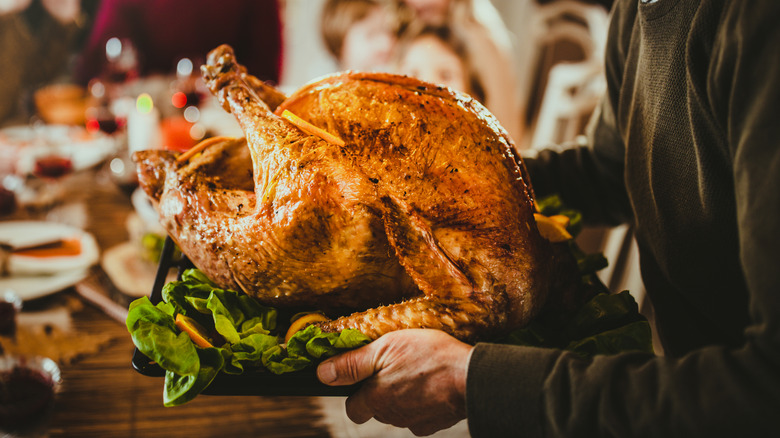What Makes A Turkey Kosher?
Whether you're a practicing Jew looking for some clarification or simply planning for Thanksgiving and wondering what your options are, kosher turkey can seem pretty vague, but it's actually quite straightforward. There are essentially two things that differentiate kosher turkeys from non-kosher turkeys. The first difference is how the bird is killed. The second difference involves salting the bird after butchering.
The rules of kosher eating require the bird to have been ritually slaughtered by a shochet (someone trained and certified to be a kosher butcher) under the supervision of a qualified rabbi. It's widely recognized that kosher butchering is one of the most humane forms of animal slaughter currently in practice. Salting the bird is done to draw out the blood from the turkey and is required by Jewish law because kosher meat must have the blood removed or cooked out before being eaten. It also has an effect on how the bird tastes. The process basically pre-brines the bird for you, saving you from the hassle of needing to do it yourself. If you were to brine a kosher turkey again at home, you would likely find it ends up too salty. It's also worth noting that kosher turkey is required to be antibiotic-free, grain-fed, and free-range.
The history of kosher
Kosher is the English version of the Hebrew word kashrut — a collection of dietary rules unique to Judaism. You can find the fundamentals of kosher eating in the Torah, the primary Jewish holy text. The beginnings of kosher date all the way back to the time of Moses (speculated to be around 1300 BC), but the rules have adapted somewhat over time. Turkey in particular has been a hotbed of debate over the years since there are certain birds that can be eaten and some that cannot, with no clear distinction of what makes a bird okay to eat or not.
Eating kosher is a common practice for practicing Jews, but there aren't any restrictions that limit non-practitioners from buying or eating kosher products. Some people prefer kosher products because of their humane practices, while others may simply enjoy the taste. But by and large, the main reason people eat kosher is to pay respect to a religious tradition that has lasted millennia.

